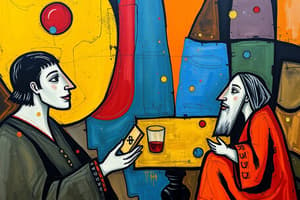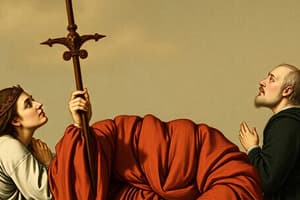Podcast
Questions and Answers
What was the primary belief of Renaissance humanism regarding human nature?
What was the primary belief of Renaissance humanism regarding human nature?
- People are essentially good. (correct)
- People are inherently selfish.
- People have no control over their destiny.
- People are primarily driven by fear.
Who is known as the father of modern humanism?
Who is known as the father of modern humanism?
- Aristotle
- Francesco Petrarch (correct)
- Plato
- Leonardo da Vinci
What did Renaissance humanism emphasize as a way to improve society?
What did Renaissance humanism emphasize as a way to improve society?
- Engagement with classical thought. (correct)
- Study of ancient religious texts.
- Strict adherence to tradition.
- Isolation from foreign ideas.
Which of the following did Petrarch NOT do as part of his humanistic contributions?
Which of the following did Petrarch NOT do as part of his humanistic contributions?
What role did civic debate play in Renaissance humanism?
What role did civic debate play in Renaissance humanism?
Which subjects were encouraged to be studied under humanism for a well-rounded education?
Which subjects were encouraged to be studied under humanism for a well-rounded education?
How did humanism influence literature during the Renaissance?
How did humanism influence literature during the Renaissance?
What was one of the key takeaways of studying classical thought according to humanism?
What was one of the key takeaways of studying classical thought according to humanism?
What central belief about human nature did Machiavelli challenge in his work, The Prince?
What central belief about human nature did Machiavelli challenge in his work, The Prince?
In The Prince, which concept does Machiavelli associate with effective leadership?
In The Prince, which concept does Machiavelli associate with effective leadership?
What conclusion does Machiavelli draw about the actions of Roman rulers?
What conclusion does Machiavelli draw about the actions of Roman rulers?
What was the significance of Machiavelli's experience with the Medici family?
What was the significance of Machiavelli's experience with the Medici family?
How did Machiavelli's definition of leadership differ from traditional humanist views?
How did Machiavelli's definition of leadership differ from traditional humanist views?
Which of the following is a theme present in Machiavelli's The Prince?
Which of the following is a theme present in Machiavelli's The Prince?
What mechanism does Machiavelli suggest as powerful for a ruler to maintain control?
What mechanism does Machiavelli suggest as powerful for a ruler to maintain control?
What contrasting ideas does Machiavelli explore in his discussion of leadership in The Prince?
What contrasting ideas does Machiavelli explore in his discussion of leadership in The Prince?
Flashcards are hidden until you start studying
Study Notes
Humanism
- Renaissance philosophy focused on humanist ideas, believing people were inherently good and could utilize reason and logic in life.
- Studying classical philosophy, art, music, and beauty contributed to personal growth and development.
- Francesco Petrarch is considered the father of modern humanism.
- Petrarch was a renowned poet who collected and shared ancient Greek and Roman literature, and wrote in both Latin and the common vernacular of the time.
- Petrarch's emphasis on learning and his belief that studying classical thought would improve society fueled the humanist movement.
- Humanism encouraged the study of classical Latin and Greek, highlighting the importance of education.
- Students studied the works of classical philosophers like Aristotle and Plato.
- Humanism encouraged civic debate, drawing inspiration from ancient Greek and Roman practices.
Humanism in Government
- Niccolò Machiavelli was a writer, philosopher, and politician who influenced later thinkers through his writings.
- Machiavelli was imprisoned and tortured by the Medici family for opposing their rule.
- His experiences of political intrigue influenced his most famous work, The Prince, a guide to acquiring and maintaining power.
- Machiavelli challenged the core belief of humanism by suggesting people were generally selfish and corrupt.
- The Prince proposed that leaders should inspire fear rather than love, employing force, cruelty, and deception when necessary for effective rule.
- Machiavelli believed that rulers could achieve greater success through fear rather than kindness.
- The Prince aligns with humanism by emphasizing human agency, emphasizing the ability of individuals to make choices.
- It also glorifies the Roman Empire, highlighting its use of force to maintain control.
- The Prince provided examples of both effective and ineffective leadership from different historical periods.
Studying That Suits You
Use AI to generate personalized quizzes and flashcards to suit your learning preferences.




